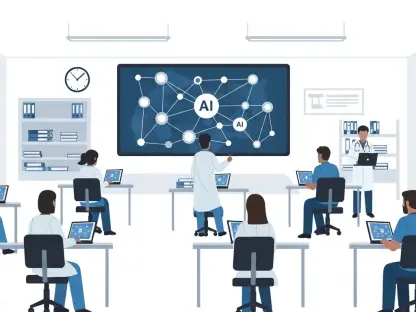The Current Landscape of Healthcare: Challenges and Opportunities
The healthcare industry stands at a critical juncture, grappling with systemic inefficiencies that impact millions of lives daily, as fragmented systems and outdated processes continue to hinder seamless care delivery. Legacy systems, designed decades ago for isolated functions, often fail to communicate effectively, resulting in delays, errors, and frustrated patients navigating a maze of disconnected services. This fragmentation not only burdens providers and payers with redundant tasks but also erodes trust among those seeking care, highlighting a pressing need for modernization.
Patient and member experience has emerged as a cornerstone of value in both healthcare and insurance sectors, where satisfaction directly correlates with loyalty and outcomes. Poorly coordinated interactions—whether during hospital visits or insurance claims—can leave individuals feeling unheard or undervalued, pushing the industry to prioritize human connection alongside operational goals. Key areas like claims processing, Electronic Health Records (EHRs), and customer service remain pain points, often operating in silos that complicate holistic care delivery.
Technological advancements, particularly Artificial Intelligence (AI) and Customer Relationship Management (CRM) systems, are reshaping these critical segments by offering tools to streamline workflows and enhance engagement. Major players, including Fortune 100 healthcare organizations, are investing heavily in digital transformation to bridge systemic disconnections, recognizing that integrated platforms can unify data and improve decision-making. As the industry evolves, the opportunity lies in leveraging these innovations to address inefficiencies while placing empathy at the heart of every interaction.
The Role of AI and CRM in Healthcare Transformation
Emerging Technologies and Trends Driving Change
AI and CRM are converging to tackle long-standing inefficiencies in healthcare, offering solutions that range from automated claims triage to personalized member support. AI-driven tools can prioritize claims based on urgency and complexity, while CRM systems provide next-best-action recommendations, enabling service representatives to address concerns with context and precision. This synergy reduces administrative friction and fosters more meaningful interactions between providers, payers, and patients.
Consumer expectations have shifted significantly, with individuals now demanding proactive, tailored care that anticipates their needs rather than merely reacting to issues. Technology plays a pivotal role in meeting these demands by enabling real-time data integration across platforms, ensuring that every touchpoint reflects a deep understanding of the individual’s journey. The push for patient-centric care continues to drive innovation, as stakeholders recognize the value of seamless provider-member interactions through unified digital ecosystems.
Market dynamics further accelerate this transformation, with a growing emphasis on integrated platforms that connect historically siloed functions. The opportunity to enhance collaboration across departments like clinical care and customer service is a powerful motivator for adoption. As these trends gain momentum, the focus remains on creating systems that not only improve efficiency but also build trust through consistent, compassionate engagement.
Measurable Impact and Future Projections
The impact of AI and CRM integration is already evident, with operational efficiencies showing double-digit improvements ranging from 13 to 37 percent in key areas like claims processing and member services, according to recent studies. Cost savings are equally compelling, with estimates suggesting up to $970 million in savings per $10 billion in payer revenue, as reported by McKinsey. These figures underscore the tangible benefits of adopting advanced technologies in a sector often constrained by tight margins.
Real-world outcomes further validate these gains, with some organizations reporting a 25 percent reduction in case resolution times and a 10-point increase in member satisfaction scores after implementing integrated solutions. Such results highlight how technology can simultaneously address operational bottlenecks and elevate the quality of care experienced by individuals. The data paints a clear picture of transformation that prioritizes both numbers and human impact.
Looking ahead, industry projections from Gartner suggest that AI and CRM adoption will continue to expand rapidly over the next few years, with a growing number of healthcare entities embedding these tools into core operations by 2027. This trajectory points to a future where data-driven insights and personalized engagement become standard, reshaping how care is delivered and experienced. The momentum indicates a sustained shift toward systems that balance efficiency with a deeper connection to patient needs.
Barriers to Scaling AI and CRM in Healthcare
The path to widespread adoption of AI and CRM in healthcare is fraught with challenges, notably the persistent issue of data silos that prevent seamless information sharing across platforms. Disparate systems, often built for specific functions without interoperability in mind, create gaps that hinder the unified view necessary for effective decision-making. Overcoming this requires a fundamental rethinking of data architecture to ensure accessibility and coherence.
Compliance complexities also pose significant hurdles, as healthcare operates under stringent regulations that govern data use and patient privacy. Integrating new technologies must account for these legal frameworks from the outset, often slowing deployment timelines and increasing costs. Beyond technical issues, human barriers such as change fatigue among staff can stall progress, as employees accustomed to traditional workflows may resist adopting unfamiliar tools or processes.
Strategies to address these obstacles include establishing cross-functional data governance to break down silos and ensure alignment across teams. Early integration of compliance measures into technology design can mitigate regulatory risks, while employee engagement initiatives—such as training and transparent communication—can ease the transition to new systems. A proactive approach that balances technological and human factors is essential for scaling innovation effectively.
Navigating the Regulatory and Ethical Landscape
The regulatory environment surrounding AI and CRM adoption in healthcare is intricate, shaped by data privacy laws and sector-specific standards that demand rigorous oversight. Ensuring compliance with these mandates is non-negotiable, as any misstep can undermine trust and expose organizations to significant penalties. Robust security measures must accompany technological advancements to safeguard sensitive information and maintain confidence among stakeholders.
Ethical considerations are equally critical, particularly in mitigating biases that may arise in AI models used for decision-making or patient engagement. Tools like Google’s What-If Tool offer a means to evaluate fairness and reliability, helping to ensure that algorithms do not inadvertently perpetuate disparities in care delivery. Addressing these concerns proactively shapes industry practices, reinforcing the commitment to equitable outcomes.
Building trust in AI-driven systems hinges on transparency and accountability, as patients and providers alike need assurance that technology serves their best interests. Regular audits and clear communication about how data is used can strengthen this foundation. As regulations evolve, staying ahead of requirements while upholding ethical standards will remain a defining challenge for the sector.
The Future of Healthcare: Empathy Through Technology
Envisioning the future of healthcare reveals AI and CRM as pivotal catalysts for creating empathetic, connected care that transcends traditional boundaries. These technologies promise to anticipate individual needs through predictive analytics, enabling interventions before issues escalate. Such capabilities could redefine interactions, making them more intuitive and supportive across every stage of the care journey.
Emerging innovations, alongside potential disruptors like advanced telemedicine platforms, are poised to further transform the landscape by enhancing accessibility and personalization. Shifting consumer preferences toward human-centric experiences will continue to drive demand for solutions that prioritize emotional resonance over purely transactional exchanges. The industry must adapt to these expectations by embedding empathy into digital frameworks.
Global digital transformation trends, coupled with evolving regulatory frameworks, will shape how these advancements unfold, necessitating continuous learning and adaptability. Transparency in technology adoption will be crucial to maintain public trust, especially as new tools influence sensitive areas of care. The convergence of innovation and compassion offers a glimpse into a system where technology amplifies, rather than replaces, the human touch.
Building a More Human Healthcare System
Reflecting on the insights gathered, it becomes evident that AI and CRM have already begun to transform healthcare by intertwining empathy with efficiency in ways previously unimagined. The journey reveals that technology, when thoughtfully applied, addresses deep-rooted inefficiencies while fostering connections that patients and members crave. Each advancement underscores the potential to rebuild trust in a system often criticized for its impersonal nature.
The path forward demands a deliberate alignment of technology with cultural and systemic shifts, a lesson learned through persistent challenges and incremental victories. Healthcare leaders are encouraged to prioritize data unification as a foundational step, ensuring that fragmented information no longer stands as a barrier to care. Engaging staff through meaningful training and support emerges as a critical action, empowering those on the front lines to embrace change.
Looking ahead, a renewed focus on ethical AI practices offers a blueprint for sustainable growth, urging organizations to embed fairness and transparency into every innovation. Committing to these principles promises not only improved patient experiences but also a legacy of care that values every individual’s story. The challenge rests in maintaining this balance, ensuring that each step taken builds a stronger, more human-centered healthcare ecosystem.









